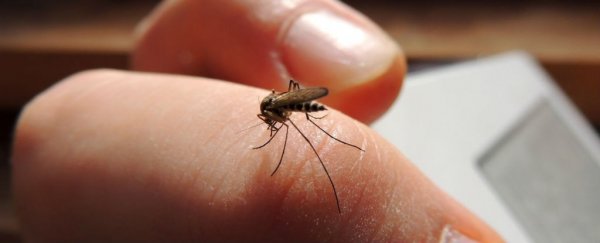For many of us, mozzie bites are an unavoidable part of life if we want the luxury of having our balcony door open on a summer's night or evening drinks on the harbour.
But apart from not scratching them at all - and come on now, let's not get too crazy - what's the most effective way of minimising the itch?
The key is in how our immune system responds to a mosquito bite in the first place.
When you're bitten, a mosquito will use its sharp, tubular proboscis to deliver saliva that's full of anticoagulants to the blood, which thins it out for quick and easy siphoning.
As researchers discovered back in 2012, these mouthparts are so small, they actually pierce individual blood cells and suck them dry.
The first ever time you get bitten by a mosquito in your life, you won't feel a thing, because your immune system hasn't had a chance to develop a coordinated response.
But once it does, it will know to deliver an unrelenting burst of histamines to the dried-up, shrunken blood cells, and these are what turns the bite wound into a red, swollen, and itchy disaster area.
This is one of those cases where your immune system ends up causing more harm than good, so the best solution to combat a histamine-related itch is to douse it in antihistamines, as Rebecca Harrington explains over at Business Insider:
"If the itch is too much to bear, apply an antihistamine cream or gel to the area, or take an antihistamine pill, recommends the US Food and Drug Administration. Look for "Diphenhydramine" in the ingredients list - Benadryl has it. Both the cream and the pills can be found over the counter and are pretty inexpensive."
Those pills can even be taken as a precaution beforehand, to deal with the inflammation as soon as you are bitten.
While antihistamines are the most widely accepted treatment for mosquito bites, there have been questions over just how effective they are.
In 2012, a study published in the Drug and Therapeutics Bulletin reviewed the available evidence for how over-the-counter treatments dealt with the itch of bug bites, and found "little direct evidence for the efficacy of treatments for simple insect bites, and, in general, recommendations for treatment are based on expert opinion and clinical experience."
They added that with ointments containing antiseptics, antihistamines, or numbing agents such as lidocaine and benzocaine only appeared to help "sometimes".
That said, "sometimes" is better than nothing, the researchers concluded, and having reviewed all available options, came to this recommendation:
"For mild local reactions, the area should be cleaned and a cold compress applied. Oral analgesics can be given for pain, and a mild corticosteroid cream applied to reduce inflammation and itching. Large local reactions can be treated with an oral antihistamine.
Non-sedating antihistamines are preferred during the day, but a sedating antihistamine can be of use at night if sleep is disturbed. Antibacterial treatment is not required for simple insect bites, but secondary infections should be treated with an oral antibacterial agent in accordance with local guidelines."
And here's some rather confronting footage of a mosquito's flexible proboscis probing a blood cell. Know your enemy, I say.
A version of this article was first published in September 2015.
